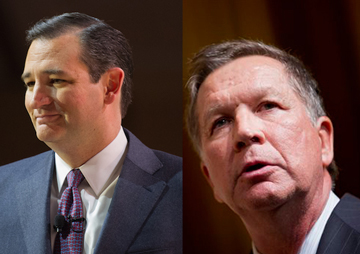The Cruz-Kasich Tag Team Is No Match for Donald Trump
Don't call it strategy, call it strategery: Ted Cruz and John Kasich are going to cooperate to attempt to deny Trump the Republican nomination. Republican presidential candidates Ted Cruz, left, and John Kasich. (Shutterstock and Pablo Martinez Monsivais / AP)
Republican presidential candidates Ted Cruz, left, and John Kasich. (Shutterstock and Pablo Martinez Monsivais / AP)
Republican presidential candidates Ted Cruz, left, and John Kasich. (Shutterstock and Pablo Martinez Monsivais / AP)
WASHINGTON — Don’t call it strategy, call it strategery: Ted Cruz and John Kasich are going to cooperate to deny Donald Trump the Republican nomination. Also, I don’t know, maybe a hurricane will dishevel Trump’s comb-over and reveal his bald pate, causing such mortification that he quits the race. Or maybe there will be an earthquake next week in Indiana, affecting only precincts where Trump has a lead.
The Cruz-Kasich pact comes at the 13th hour. Its announcement Sunday seemed orchestrated to distract attention from the fact that Trump is expected to sweep five more primaries Tuesday — in Pennsylvania, Maryland, Delaware, Connecticut and Rhode Island — making a contested GOP convention even less likely.
That Cruz and Kasich have joined forces merely illustrates what a paper tiger the “Never Trump” movement has been. Trump is right — I hate when I have to write those words — to call the arrangement an “act of desperation” by two candidates who are “mathematically dead” in the quest for a majority of delegates.
For weeks, Cruz has portrayed Kasich as nothing but a spoiler who has kept Republicans from rallying around the single candidate — Cruz himself, in his view — who can unite the party against Trump. Kasich, meanwhile, has scoffed at Cruz’s electability and portrayed himself as the only contender who can beat the likely Democratic nominee, Hillary Clinton.
In truth, the only way either man could become the nominee is at a contested convention. I remain deeply skeptical that delegates will seek to deny Trump if he arrives in Cleveland with, say, 1,100 of the 1,237 pledged first-ballot votes he needs. But following his landslide victory in New York last week, it became increasingly likely that Trump will secure his majority before the convention.
Cruz and Kasich would like everyone to look past the five “Acela corridor” states that vote Tuesday. But a total of 172 delegates are at stake in those contests; for comparison, that’s the same number that will be up for grabs in California on June 7. If Trump performs as well this week as polls suggest, his path to the nomination begins to look more like a cruise than a scramble.
Not so fast, the Cruz camp claims. It all supposedly comes down to Indiana, which votes May 3 and will award 57 delegates. If Cruz can win all or most of them, he says, Trump will no longer be able to reach 1,237. The nomination would be decided on the convention floor, where Cruz’s superior inside game would win the day.
To that end, Kasich has agreed to not compete in Indiana. In return, Cruz will not compete in Oregon and New Mexico, states where Kasich is the leading anti-Trump alternative.
But this scenario is full of holes. For one thing, the Real Clear Politics poll average gives Trump a solid lead over Cruz in Indiana, 39 percent to 33 percent. And a Fox News poll last week showed that even with Kasich out of the race, Trump would still have a narrow lead, 44 percent to 42 percent.
That can hardly be called great news for Cruz, who needs to win blowouts, not squeakers. And even if he managed to come away with almost all of Indiana’s delegates, Cruz still would not have a realistic path to a majority. Trump, by contrast, would.
Oh, and in other states yet to hold primaries, such as California and New Jersey, Cruz and Kasich would still be campaigning independently and presumably splitting the anti-Trump vote. This could change, I suppose — Cruz and Kasich could theoretically agree to target different congressional districts in California, for example. But come on. Both candidates have trouble getting across the message “Vote for me.” I seriously doubt they’ll do better with “You over here, vote for me. You over there, vote for this other guy, even if you don’t want him to win.”
The whole “Never Trump” thing is more like “Pretty Please Not Trump.” Establishment Republicans wring their hands, beat their breasts and wail about how awful Trump is, how uncouth, how unacceptable as the presidential candidate of the party of Lincoln — and then, when pressed, meekly say they’ll support him if he’s the nominee.
What are voters to think? Perhaps that career politicians speak out of both sides of their mouths. Perhaps that Trump is right when he claims an effort is underway to “steal” a nomination he is winning fair and square.
Let’s be honest: So far, Trump has run circles around his more experienced rivals. Why does anyone think this will suddenly change?
Eugene Robinson’s email address is [email protected].
© 2016, Washington Post Writers Group
Your support matters…Independent journalism is under threat and overshadowed by heavily funded mainstream media.
You can help level the playing field. Become a member.
Your tax-deductible contribution keeps us digging beneath the headlines to give you thought-provoking, investigative reporting and analysis that unearths what's really happening- without compromise.
Give today to support our courageous, independent journalists.






You need to be a supporter to comment.
There are currently no responses to this article.
Be the first to respond.